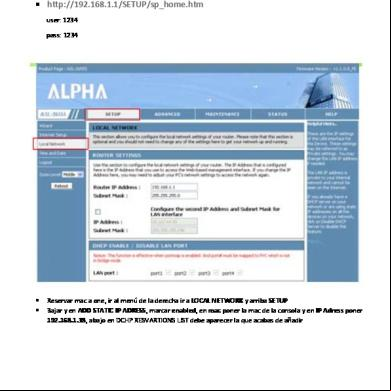Dmz Lab Security Policy-2 t6s6w
This document was ed by and they confirmed that they have the permission to share it. If you are author or own the copyright of this book, please report to us by using this report form. Report 3b7i
Overview 3e4r5l
& View Dmz Lab Security Policy-2 as PDF for free.
More details w3441
- Words: 1,217
- Pages: 4
Consensus Policy Resource Community
DMZ Lab Security Policy Free Use Disclaimer: This policy was created by or for the SANS Institute for the Internet community. All or parts of this policy can be freely used for your organization. There is no prior approval required. If you would like to contribute a new policy or updated version of this policy, please send email to [email protected]. Things to Consider: Please consult the Things to Consider FAQ for additional guidelines and suggestions for personalizing the policy for your organization Last Update Status: Retired
1. Overview See Purpose.
2. Purpose This policy establishes information security requirements for all networks and equipment deployed in
labs located on the "De-Militarized Zone" (DMZ). Adherence to these requirements will minimize the potential risk to
from the damage to public image caused by unauthorized use of
resources, and the loss of sensitive/company confidential data and intellectual property.
3. Scope
Lab networks and devices (including but not limited to routers, switches, hosts, etc.) that are Internet facing and located outside
corporate Internet firewalls are considered part of the DMZ Labs and are subject to this policy. This includes DMZ Labs in primary Internet Service Provider (ISP) locations and remote locations. All existing and future equipment, which falls under the scope of this policy, must be configured according to the referenced documents. This policy does not apply to labs residing inside
's corporate Internet firewalls. Standards for these labs are defined in the Internal Lab Security Policy
4. Policy 3.1. Ownership and Responsibilities 1. All new DMZ Labs must present a business justification with sign-off at the business unit Vice President level. The Infosec Team must keep the business justifications on file. 2. Lab owning organizations are responsible for asg lab managers, point of (POC), and back up POC, for each lab. The lab owners must maintain up to date POC information with the Infosec Team [and the corporate enterprise management system, if one exists]. Lab managers or their backup must be available around-the-clock for emergencies.
SANS Institute 2014 – All Rights Reserved
Page 1
Consensus Policy Resource Community
3. Changes to the connectivity and/or purpose of existing DMZ Labs and establishment of new DMZ Labs must be requested through a
Network Organization and approved by the Infosec Team. 4. All ISP connections must be maintained by a
Network Organization. 5. A Network Organization must maintain a firewall device between the DMZ Lab(s) and the Internet. 6. The Network Organization and The Infosec Team reserve the right to interrupt lab connections if a security concern exists. 7. The DMZ Lab will provide and maintain network devices deployed in the DMZ Lab up to the Network Organization point of demarcation. 8. The Network Organization must record all DMZ Lab address spaces and current information [in the corporate enterprise management system, if one exists]. 9. The DMZ Lab Managers are ultimately responsible for their DMZ Labs complying with this policy. 10. Immediate access to equipment and system logs must be granted to of the Infosec Team and the Network Organization upon request, in accordance with the Audit Policy 11. Individual lab s must be deleted within three (3) days when access is no longer authorized. Group s must comply with the Policy and must be changed within three (3) days from a change in the group hip. 12. The Infosec Team will address non-compliance waiver requests on a case-by-case basis. 3.2. General Configuration Requirements 1. Production resources must not depend upon resources on the DMZ Lab networks. 2. DMZ Labs must not be connected to
's corporate internal networks, either directly or via a wireless connection. 3. DMZ Labs should be in a physically separate room from any internal networks. If this is not possible, the equipment must be in a locked rack with limited access. In addition, the Lab Manager must maintain a list of who has access to the equipment. 4. Lab Managers are responsible for complying with the following related policies: a. Policy b. Wireless Communications Policy SANS Institute 2014 – All Rights Reserved
Page 2
Consensus Policy Resource Community
c. Lab Policy 5. The Network Organization maintained firewall devices must be configured in accordance with least-access principles and the DMZ Lab business needs. All firewall filters will be maintained by the Infosec Team. 6. The firewall device must be the only access point between the DMZ Lab and the rest of
's networks and/or the Internet. Any form of cross-connection which byes the firewall device is strictly prohibited. 7. Original firewall configurations and any changes thereto must be reviewed and approved by the Infosec Team (including both general configurations and rule sets). The Infosec Team may require additional security measures as needed. 8. Traffic from DMZ Labs to the
internal network, including VPN access, falls under the Remote Access Policy 9. All routers and switches not used for testing and/or training must conform to the DMZ Router and Switch standardization documents. 10. Operating systems of all hosts internal to the DMZ Lab running Internet Services must be configured to the secure host installation and configuration standards. [Add url link to site where your internal configuration standards are kept]. 11. Current applicable security patches/hot-fixes for any applications that are Internet services must be applied. istrative owner groups must have processes in place to stay current on appropriate patches/hotfixes. 12. All applicable security patches/hot-fixes recommended by the vendor must be installed. istrative owner groups must have processes in place to stay current on appropriate patches/hotfixes. 13. Services and applications not serving business requirements must be disabled. 14.
Confidential information is prohibited on equipment in labs where non-
personnel have physical access (e.g., training labs), in accordance with the Data Classification and Protection Policy. 15. Remote istration must be performed over secure channels (e.g., encrypted network connections using SSH or IPSEC) or console access independent from the DMZ networks.
5. Policy Compliance 5.1 Compliance Measurement The Infosec Team will compliance to this policy through various methods, including but not limited to, periodic walk-thrus, video monitoring, business tool reports, internal and external audits, and to the policy owner. SANS Institute 2014 – All Rights Reserved
Page 3
Consensus Policy Resource Community
5.2 Exceptions Any exception to the policy must be approved by the Infosec Team in advance. 5.3 Non-Compliance An employee found to have violated this policy may be subject to disciplinary action, up to and including termination of employment.
6 Related Standards, Policies and Processes
Audit Policy Data Classification and Protection Policy Lab Policy Policy Wireless Communications Policy
7 Definitions and The following definition and can be found in the SANS Glossary located at: https://www.sans.org/security-resources/glossary-of-/
Access Control Lists (ACLs) De-militarized zone (DMZ) Least Access Principle Internet Services Network Organization Point of Demarcation Lab Manager Lab Firewall
8 Revision History Date of Change
Responsible
Summary of Change
July 2014
SANS Policy Team
Converted to new format and retired. Appropriate sections merged into the Lab Security Policy.
SANS Institute 2014 – All Rights Reserved
Page 4
DMZ Lab Security Policy Free Use Disclaimer: This policy was created by or for the SANS Institute for the Internet community. All or parts of this policy can be freely used for your organization. There is no prior approval required. If you would like to contribute a new policy or updated version of this policy, please send email to [email protected]. Things to Consider: Please consult the Things to Consider FAQ for additional guidelines and suggestions for personalizing the policy for your organization Last Update Status: Retired
1. Overview See Purpose.
2. Purpose This policy establishes information security requirements for all networks and equipment deployed in
3. Scope
4. Policy 3.1. Ownership and Responsibilities 1. All new DMZ Labs must present a business justification with sign-off at the business unit Vice President level. The Infosec Team must keep the business justifications on file. 2. Lab owning organizations are responsible for asg lab managers, point of (POC), and back up POC, for each lab. The lab owners must maintain up to date POC information with the Infosec Team [and the corporate enterprise management system, if one exists]. Lab managers or their backup must be available around-the-clock for emergencies.
SANS Institute 2014 – All Rights Reserved
Page 1
Consensus Policy Resource Community
3. Changes to the connectivity and/or purpose of existing DMZ Labs and establishment of new DMZ Labs must be requested through a
Page 2
Consensus Policy Resource Community
c. Lab Policy 5. The Network Organization maintained firewall devices must be configured in accordance with least-access principles and the DMZ Lab business needs. All firewall filters will be maintained by the Infosec Team. 6. The firewall device must be the only access point between the DMZ Lab and the rest of
5. Policy Compliance 5.1 Compliance Measurement The Infosec Team will compliance to this policy through various methods, including but not limited to, periodic walk-thrus, video monitoring, business tool reports, internal and external audits, and to the policy owner. SANS Institute 2014 – All Rights Reserved
Page 3
Consensus Policy Resource Community
5.2 Exceptions Any exception to the policy must be approved by the Infosec Team in advance. 5.3 Non-Compliance An employee found to have violated this policy may be subject to disciplinary action, up to and including termination of employment.
6 Related Standards, Policies and Processes
Audit Policy Data Classification and Protection Policy Lab Policy Policy Wireless Communications Policy
7 Definitions and The following definition and can be found in the SANS Glossary located at: https://www.sans.org/security-resources/glossary-of-/
Access Control Lists (ACLs) De-militarized zone (DMZ) Least Access Principle Internet Services Network Organization Point of Demarcation Lab Manager Lab Firewall
8 Revision History Date of Change
Responsible
Summary of Change
July 2014
SANS Policy Team
Converted to new format and retired. Appropriate sections merged into the Lab Security Policy.
SANS Institute 2014 – All Rights Reserved
Page 4










